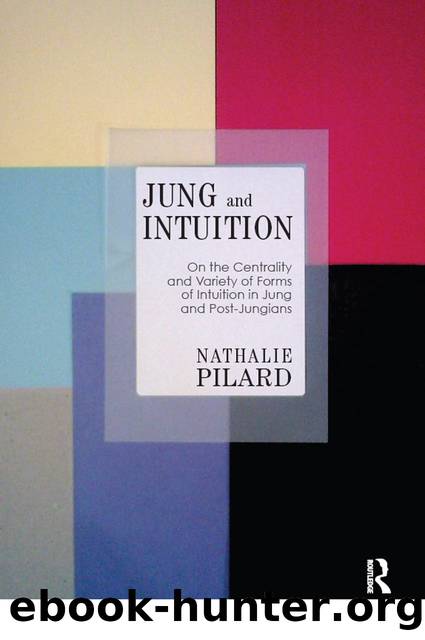Jung and Intuition by Nathalie Pilard

Author:Nathalie Pilard [Pilard, Nathalie]
Language: eng
Format: azw3
Publisher: Taylor and Francis
Published: 2018-05-15T00:00:00+00:00
Dominants and primordial images as antecedents of archetypes
The notions of âdominantsâ, primordial images (Urbild), and archetypes are close. Both the terms âprimordial imagesâ and âdominantsâ preceded âarchetypesâ and would reappear in Jungâs later work, even after the use of âarchetypeâ, notably in Jungâs works on alchemy (see, for example, Jung CW 8, par. 423). In 1917, Jung explains that, while progressing to consciousness, humankind simultaneously enriched the unconscious:
The collective unconscious is the sediment of all the experience of the universe of all time, and is also an image of the universe that has been in process of formation for untold ages. In the course of time certain features have become prominent in this image, the so-called dominants. These dominants are the ruling powers, the gods; that is, the representation resulting from average regularities in the issue of the images that the brain has received as a consequence of secular processes. (Jung, 1917a, p. 432)
This extract theoretically met with the issues of the temporal and a-temporal aspects of the contents of the collective unconscious, which were always in the process of formation. Jungâs evolutionism must be considered both chronologically and structurally because of the timelessness of the collective unconscious and its invariable influence on consciousness. Dominants were temporalâthe result of the sedimentation of the collective unconsciousâand a-temporal, the universal characteristic features (dominants) invariably observed from time immemorial.
Intuition explains this theoretical paradox. In Psychology of the Unconscious (1917a), Jung quotes a letter by the Swiss historian Jacob Burckhardt, which provides us with an example:
What you are destined to find in Faust, that you will find by intuition. Faust is nothing else than pure and legitimate myth, a great primitive conception, so to speak, in which everyone can divine in his own way his own nature and destiny. Allow me to make a comparisonâ¦. There was a chord of the Oedipus legend in every Greek which longed to be touched directly and respond in its own way. And thus it is with the German nation and Faust (Jung, 1917a, p. 490, n. 42, my italics).162
Intuition links Oedipus to Greeks, Faust to Germans, and contemporaries such as Burckhardtâs correspondent to Faust. Temporality and a-temporality coexist. As Jung commented on the letter, âevery Greek of the classical era carried in himself a fragment of the Oedipus, just as every German carries a fragment of Faustâ (Jung, 1917a, p. 40). Jungâs âjust asâ contained the paradox of the future archetype through the analogical role of intuition. Albeit belonging to different eras, Faust and Oedipus were absolutely equivalent (they were âjust asâ) through the common intuitive perception everybody had of them, that is, their archetype, universal and a-temporal. This is why Burckhardt referred his friend to intuition to understand Faust in the best possible way. Jungâs example revealed his understanding of the archetype before its enunciation, but the reader of 1917 could neither fathom the notion of archetype through a too vague âjust asâ nor understand the hero as a âruling powerâ, a dominant.
The qualitative aspect that
Download
This site does not store any files on its server. We only index and link to content provided by other sites. Please contact the content providers to delete copyright contents if any and email us, we'll remove relevant links or contents immediately.
The Art of Thinking Clearly by Rolf Dobelli(10489)
The 5 Love Languages: The Secret to Love That Lasts by Gary Chapman(9815)
Mindhunter: Inside the FBI's Elite Serial Crime Unit by John E. Douglas & Mark Olshaker(9344)
Becoming Supernatural by Dr. Joe Dispenza(8218)
Nudge - Improving Decisions about Health, Wealth, and Happiness by Thaler Sunstein(7709)
The Road Less Traveled by M. Scott Peck(7603)
Mastermind: How to Think Like Sherlock Holmes by Maria Konnikova(7347)
Enlightenment Now: The Case for Reason, Science, Humanism, and Progress by Steven Pinker(7314)
Win Bigly by Scott Adams(7199)
The Way of Zen by Alan W. Watts(6615)
Factfulness: Ten Reasons We're Wrong About the World – and Why Things Are Better Than You Think by Hans Rosling(4742)
The State of Affairs by Esther Perel(4723)
Gerald's Game by Stephen King(4654)
Man's Search for Meaning by Viktor Frankl(4607)
The Confidence Code by Katty Kay(4264)
Thinking in Bets by Annie Duke(4227)
The Healing Self by Deepak Chopra(3583)
Hidden Persuasion: 33 psychological influence techniques in advertising by Marc Andrews & Matthijs van Leeuwen & Rick van Baaren(3566)
The Worm at the Core by Sheldon Solomon(3487)
